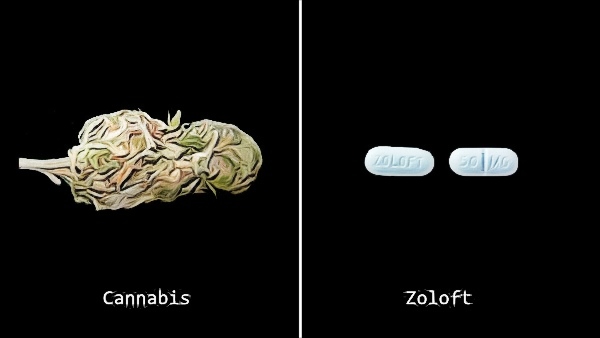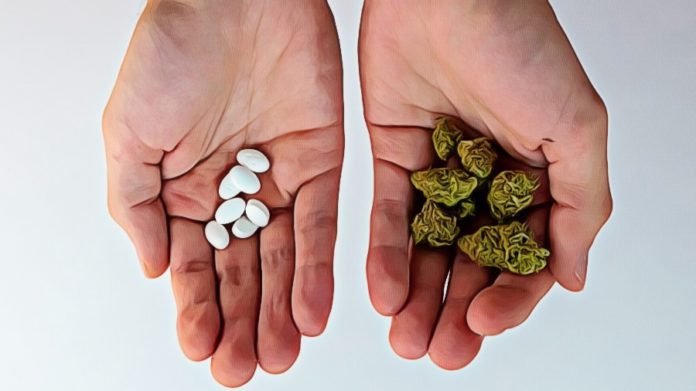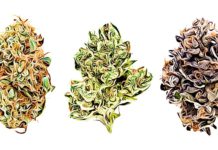Zoloft and Weed: Treatment or Toxin?
Zoloft is currently one of the leading prescription medications being used today to treat depression. It belongs to a class of drugs called selective serotonin reuptake inhibitors (SSRIs) that helps increase serotonin levels in the brain. However, more states are legalizing marijuana, and weed can also treat depression. But what happens if you mix weed with Zoloft?
Though more research needs to be done on marijuana and Zoloft interactions, people who mix these two substances may experience side effects. This article discusses what effects these substances have on the human body when used separately and in conjunction with each other.
What is Zoloft?
Zoloft, also called sertraline hydrochloride, is an antidepressant that belongs to a class of medications called selective serotonin reuptake inhibitors (SSRIs).
SSRIs essentially work by preventing the reuptake of serotonin, a natural chemical in the brain that affects mood and emotions. It’s more commonly known as the feel-good hormone since it plays a key role in staving off anxiety and depression. SSRIs essentially allow more serotonin to remain in the brain and reach the receptors that respond to it.
What Happens When You Mix Zoloft and Marijuana?
Marijuana and Zoloft are both naturally occurring substances, but they may interact with each other and cause side effects. Medical studies have shown that mixing marijuana with Zoloft can affect your brain in both positive and negative ways. Many studies have explored the effects of marijuana on the human body, but very little research has been conducted on the effects of mixing marijuana with Zoloft.
In a 2006 study published in the journal Neuropsychopharmacology, researchers attempted to determine how marijuana affects patients taking Zoloft. The researchers found that a single low dose (1 mg) of Zoloft reduced the effects of marijuana when taken together.
However, a high dose (25 mg) of Zoloft heightened the effects of marijuana, particularly the high. The research team also stated that combining Zoloft with marijuana is more likely to produce serious side effects.
How Zoloft and Marijuana Affects the Brain
While Zoloft and weed have served as effective treatments for conditions like depression and anxiety, they are also neurotoxic. This means that they can damage the nerve cells in the brain and cause negative side effects.

Researchers explain that many people who use marijuana also have high levels of anandamide, a natural cannabinoid produced in the brain. The brain also produces endocannabinoids to induce feelings of pleasure and mitigate pain. When smoking weed, people can get a high that is similar to the effect of increased dopamine levels in the brain.
Some patients who take Zoloft may have a difficult time stopping or controlling their marijuana use. In fact, a 2018 study published in the journal Human Psychopharmacology: Clinical and Experimental found that marijuana use can significantly increase the risk of antidepressant discontinuation syndrome (ADS). This syndrome is characterized by symptoms such as:
- Extreme Fatigue
- Difficulty Sleeping and Insomnia
- Irritability and Aggression
- Lack of Appetite
- Restlessness and Nervousness
- Adverse Drug Interactions
When you take marijuana with Zoloft, the two substances interact with each other in the brain. It’s still unclear how these two substances interact when used together. Patients who use marijuana in conjunction with Zoloft may experience the following:
- Symptoms of ADS
- Excessive Sleepiness
- Dizziness
- Increased Appetite
- Nausea
- Euphoria
- Dry Mouth
Why Do People Take Zoloft?
The brain naturally makes serotonin, but it also gets serotonin from the foods that we eat. The body uses serotonin to control mood, sleep, and appetite.
Research suggests that serotonin levels may influence depression and anxiety, which are the primary reasons why people take Zoloft. The drug itself is not a cure for these conditions. Instead, it helps control symptoms and reduces their impact on patients’ quality of life.
How Does Zoloft Work?
Zoloft is a prescription medication that you take orally. One of the main reasons why people take the medication is to control symptoms of depression. While Zoloft’s exact mechanism of action is not fully understood, experts believe that the drug works by blocking the reuptake of serotonin by the presynaptic neuron in the brain. This means that more serotonin reaches receptors in the brain and boosts mood.
Zoloft may also work by enhancing the efficiency of serotonin in the brain and by preventing serotonin from being broken down by the enzymes in the brain.
The Benefits of Zoloft
According to the National Institute of Mental Health, Zoloft is the most widely prescribed antidepressant medication on the market today. It can help relieve symptoms of depression and prevent those symptoms from coming back.
If you suffer from premenstrual depression (PMDD), Zoloft can relieve symptoms that most often appear in the second half of your menstrual cycle. PMDD is an extreme form of premenstrual syndrome (PMS) that makes some women feel depressed, anxious, and irritable in the latter part of their cycle.
The medication may also improve the mood of people who have postpartum depression. This is a form of depression that may develop when a mother experiences the hormonal and physical changes that come after giving birth.
Zoloft may also be used to treat other conditions such as social anxiety disorder (SAD), panic disorder, obsessive-compulsive disorder (OCD), post-traumatic stress disorder (PTSD), and panic disorder.
Zoloft Side Effects
Before taking Zoloft, patients should talk to their doctors about the possible side effects and drug interactions that may be associated with this medication. While effective, Zoloft can cause some unwanted side effects:
- Nausea
- Nervousness
- Trouble Sleeping
- Diarrhea
- Rapid Heartbeat
- Dry Mouth
- Dizziness
- Headache
- Stomach Pain
- Mild Weight Gain
Zoloft may also make you feel tired or drowsy. It’s important to know that these side effects are temporary and should go away as your brain adjusts to the drug.
Some people also experience more serious side effects, such as restlessness, excitability, confusion, and mania. Some of these severe side effects may require immediate medical attention, so you should speak to your doctor or contact your local poison control center immediately.
Marijuana Side Effects
Marijuana, or weed, is an herbal substance that comes from an herb in the cannabis family. While there are several products made from weed, marijuana refers to the dried buds and leaves of the cannabis plant. It has more than 60 cannabinoids, which are natural chemicals found in the brain and nervous system. The two cannabinoids that researchers have studied extensively are tetrahydrocannabinol (THC) and cannabidiol (CBD).
THC is the ingredient in marijuana that produces a high and other psychoactive effects. CBD is non-psychoactive. Most strains of marijuana contain a mixture of these two cannabinoids. Like Zoloft, marijuana can cause some unwanted side effects that are usually mild, such as:
- Dizziness
- Drowsiness
- Increased appetite
- Bloodshot Eyes
- Dry Mouth
- Trouble Sleeping
- Paranoia
The most serious side effects usually go away as your brain adjusts to marijuana.
Most people who take marijuana do not experience a severe reaction to the drug. For example, a condition called cannabinoid hyperemesis syndrome (CHS) may develop in those who use weed on a regular basis. CHS is characterized by nausea, vomiting, and abdominal pain that persists for several hours or longer.
According to a study published in the journal Cannabis and Cannabinoid Research, CHS is more common in patients who use high-THC strains. Experts believe that the strain or the way you consume marijuana can trigger CHS.
Conclusion
Zoloft and marijuana are both effective treatments for anxiety and depression. However, these two drugs interact with each other in the brain. They may intensify each other’s effects or cause side effects that you may not like. If you’re concerned about mixing Zoloft and marijuana, talk to your doctor about your concerns.
Sources:
















